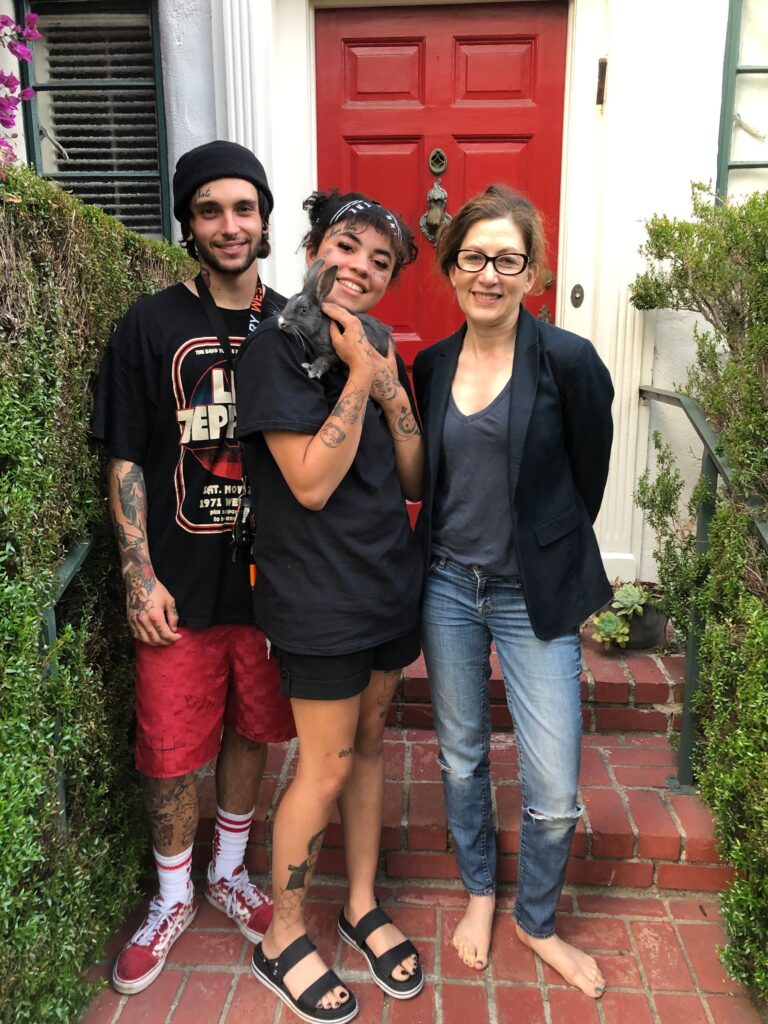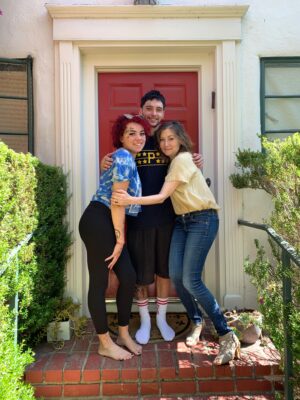Being Jewish
Family
What It Means to Welcome Strangers Into Your Home
The first few nights they spent under my roof, I couldn’t sleep. I stashed the closest thing I could find to a weapon, a rusty hatchet, under my bed. Why had I invited two homeless strangers and their bunny rabbit into my house?
By that point in the spring of 2019, a slew of students and writers had already logged time in my guest bedroom. Taking in boarders after my divorce and my child went off to college not only provided a steady stream of income; it also had returned that reliable hubbub of family life I missed when my nest emptied. I used to love waking up to find teenagers sleeping about the house in piles, like a pride of lions. Better my home than elsewhere, I figured. Every weekend, I’d crank out heaping piles of pancakes and matzah brei, the Jewish Hamburger Helper of egg dishes. The most reliable way to get teens to make eye contact, grunt in your direction or even sometimes engage in conversation is when shoveling food onto their plates.
But while sharing space with students was one thing, hosting the couple and their Jersey Wooly dwarf rabbit was not plan A, B or even C.
When a tenant fell out without notice, I happened to catch a local Jewish couple, Marlene and Michael Rapkin, being interviewed on my Los Angeles NPR station about “walking the walk” of their social justice values and “welcoming the stranger.” As I understand it, the remembrance that “we were once strangers in the land of Egypt” compels us Jews to empathize with all who are experiencing injustice and oppression. It was in this spirit that the Rapkins had welcomed a couple into their home as part of an innovative rapid rehousing program for young people between the ages of 18 and 24. I assumed they were foreign exchange students. This Host Home program, as it’s called, offered a small monthly stipend. It wouldn’t be as much as I’d been pulling in, but it was something.
That’s how I wound up at a picnic that was not unlike a Match.com mingle for the unhoused and featured a drum circle, group meditation and vegan delights. I live in Los Angeles, after all. After meeting a few young people, a staff member gestured toward two young adults near the beverage station. “That’s Keyawna and Jesse; we’d like to place them with you.”
They looked…sketchy. Both of their faces were inked. I associate facial tattoos with drugs and gangs. Plus, I wouldn’t feel safe being outnumbered. Just then, an adorable bunny that Keyawna was holding leapt from her arms and the couple scampered after it.
“Anyone but them,” I said.
“Are you sure?” the staff member said. “They’re living in their car.”
“I’m positive.”
That night, lingering in the guest bedroom, I thought about how in the early part of the 20th century, the synagogue sisterhoods and the yenta networks in the South, where I’m originally from, were always on the lookout for those in need. Invitations would be issued for dinner and/or lodging to Jews traveling in the area, as we might not feel welcome elsewhere.

In the 1950s, my grandmother Rebecca heard that “an oil man from Texas” would be passing through our hometown of Mobile, Ala. She invited him over for dinner, and then another dinner. She had an ulterior motive: Those dinners led to marriage for her daughter, Phyllis. That oilman is my uncle Herbie from Waco. Was I being offered an opportunity to follow in her footsteps (minus the shidduch)? It seemed wrong to have an empty bedroom when approximately 4,800 youths were living on the street in my city.
I decided to welcome Keyawna and Jesse into my home.
The morning of their arrival, I got up at 6 a.m. I scoured their bathroom, laid out my fluffiest towels, made their bed with my highest-thread-count sheets and placed fresh flowers in their room. Then I hid my jewelry and Rebecca’s sterling silverware, unearthed the rusty hatchet from the garage and tested out the lock on my bedroom door.

My houseguests arrived and immediately occupied themselves with suspicious activities like sewing, drawing and reading books. I’d been instructed in Host Home’s training sessions that I wasn’t signing on to assume a parental role but to provide positive role modeling and a safe space for them to evaluate next steps with their housing case manager.
My inner circle fretted for my safety. “Text me before you go to bed,” one friend urged. I made light of my own fears with my own texts: “It’s been 24 hours and my house hasn’t burned down.” Meanwhile, my guests prepared salads, unloaded the dishwasher (unprompted), called their mothers and joined the congregation of a church.
We began having meals together. They didn’t owe me their story, but they were eager to share it. Both hailed from an area in Pennsylvania that has one of the highest opioid addiction rates in the nation, where one in five children grows up in poverty and employment opportunities are mostly limited to the fracking industry and a local steel mill. Both had attended a year of college and then forfeited their scholarships, partly out of a desire to contribute more quickly to their families’ strained finances, but also in hopes of pursuing careers in the arts.
They’d saved up moving money, but didn’t know a single person when they arrived in Los Angeles hoping to make contacts in the music industry and art world. Without community ties and unused to big city life, they fell victim to a number of scams and shady landlords. The majority of their clothing and possessions were stolen at a hostel. They were robbed at gunpoint. Twice. They’d gotten work as DoorDash delivery drivers, started couch surfing and spent the occasional night in the car. Gradually, the number of nights spent in the car outnumbered the nights under a roof. One day, they ran out of couches.
I’d call my sister, Lisa, after hearing their stories and say, “The problems are so overwhelming, my contribution is too small to make a difference, it seems pointless.”
Lisa, my own version of myjewishlearning.com, would remind me, “Don’t forget about Pirkei Avot. It is not incumbent upon you to finish the task, but neither are you free to absolve yourself from it.”
I had more in common with my guests than I’d imagined. Like them, my family’s unstable finances and my impatience to launch an acting career led to my dropping out of college. We’d all moved to Los Angeles with approximately the same amount of savings, only they’d earned their money doing manual labor jobs while I’d cashed in stocks that I’d been given for my bat mitzvah. My access to a wealthier and wider social network gave me an advantage, along with coming of age when housing was more affordable and before the gig economy destabilized the workforce. I’d couch surfed, too, only I never ran out of places to crash.
The month they spent with me allowed them to stabilize their lives. After that, they moved on to another Host Home, waiting for that much-sought-after affordable housing to open up, and three months later it did, in a neighborhood close to my own.

Not long after they moved out, we celebrated Keyawna’s and my birthdays together. We were born two days, 37 years and many zip codes apart. While we picnicked in my backyard, Jesse asked if he could look in the guest bedroom—they’d hidden their valuables when they first arrived, and thought they might have left something behind. As much as I wasn’t sure who they were, they’d worried over what kind of person I was. I know now that I’d been mistaken: They were never strangers; they were just neighbors I hadn’t yet met.
Annabelle Gurwitch is The New York Times best-selling author of You’re Leaving When?: Adventures in Downward Mobility, from which this essay was adapted.










 Facebook
Facebook Instagram
Instagram Twitter
Twitter
Leave a Reply